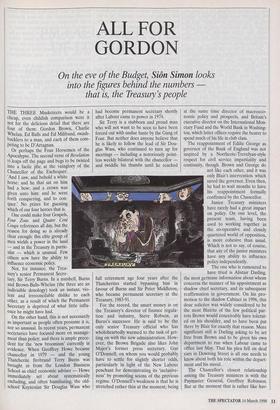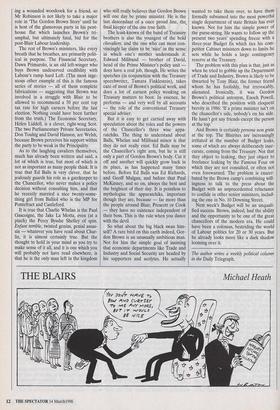ALL FOR GORDON
On the eve of the Budget, Sion Simon looks
into the figures behind the numbers - that is, the Treasury's people
THE THREE Musketeers would be a cheap, even childish comparison were it not for the delicious detail that there are four of them: Gordon Brown, Charlie Whelan, Ed Balls and Ed Miliband, swash- bucklers to a man, and each of them com- peting to be D'Artagnan.
One could make four Gospels, Four Zoas and Quatre Cent Coups references all day, but the reason for doing so is already clear enough: this elite group of men wields a power in the land — and in the Treasury in partic- ular — which is unusual. Few others now have the ability to Influence economic policy.
Not, for instance, the Trea- sury's senior Permanent Secre- tary, Sir Terry Burns. In a nutshell, Burns and Brown-Balls-Whelan (the three are an indivisible doxology) took an instant, vio- lent and irreconcilable dislike to each other, as a result of which the Permanent Secretary is deprived of what little influ- ence he might have had. On the other hand, this is not necessarily as important as people often presume it is, nor so unusual. In recent years, permanent secretaries have focused more on manage- ment than policy; and there is ample prece- dent for the 'new broomism' currently in evidence. When Geoffrey Howe became chancellor in 1979 — and the young Thatcherite firebrand Terry Burns was brought in from the London Business School as chief economic adviser — Howe immediately set about systematically excluding, and often humiliating, the old- school Keynesian Sir Douglas Wass who had become permanent secretary shortly after Labour came to power in 1974.
Sir Terry is a stubborn and proud man who will not want to be seen to have been forced out with undue haste by the Gang of Four. But neither does anyone believe that he is likely to follow the lead of Sir Dou- glas Wass, who continued to turn up for meetings — including a notoriously point- less weekly bilateral with the chancellor and twiddle his thumbs until he reached full retirement age four years after the Thatcherites started bypassing him in favour of Burns and Sir Peter Middleton, who became permanent secretary at the Treasury, 1983-91.
For the record, the smart money is on the Treasury's director of finance regula- tion and industry, Steve Robson, as Burns's successor. He is said to be the only senior Treasury official who has wholeheartedly warmed to the task of get- ting on with the new administration. How- ever, the Brown Brigade also likes John Major's former press secretary, Gus O'Donnell, on whom you would probably have to settle for slightly shorter odds, particularly in light of the New Labour penchant for demonstrating its 'inclusive- ness' by promoting scions of the previous regime. O'Donnell's weakness is that he is stretched rather thin at the moment, being at the same time director of macroeco- nomic policy and prospects, and Britain's executive director on the International Mon- etary Fund and the World Bank in Washing- ton, which latter offices require the bearer to spend much of his life in club class.
The reappointment of Eddie George as governor of the Bank of England was not inspired by a Northcote-Trevelyan-style respect for civil service impartiality and continuity, though. Brown and George do not like each other, and it was only Blair's intervention which saved the governor. Even then, he had to wait months to have his reappointment formally confirmed by the Chancellor.
Junior Treasury ministers have rarely had a great impact on policy. On one level, the present team, having been used to working together in the co-operative and closely quartered world of opposition, is more cohesive than usual. Which is not to say, of course, that any of the junior ministers have any ability to influence policy independently.
The one who is rumoured to have tried is Alistair Darling, the most germane information about whom concerns the manner of his appointment as shadow chief secretary, and its subsequent reaffirmation in government. On his pro- motion to the shadow Cabinet in 1996, this dour solicitor was widely considered to be the most Blairite of the few political par- rots Brown would conceivably have tolerat- ed on his shoulder, and to have been put there by Blair for exactly that reason. More significant still is Darling asking to be set free from Brown and to be given his own department to run when Labour came to office last May. That his plea fell on deaf ears in Downing Street is all one needs to know about both his role within the depart- ment and his mood.
The Chancellor's closest relationship among the Treasury ministers is with the Paymaster General, Geoffrey Robinson. But at the moment that is rather like hav- ing a wounded woodcock for a friend, so Mr Robinson is not likely to take a major role in 'The Gordon Brown Story' until he is host of the glamorous party in his pent- house flat which launches Brown's tri- umphal, but ultimately fatal, bid for the post-Blair Labour leadership, The rest of Brown's ministers, like every breath that he breathes, are primarily polit- ical in purpose. The Financial Secretary, Dawn Primarolo, is an old left-winger who buys Brown undeserved credibility with Labour's rump hard Left. (The most inge- nious other example of this is the famous series of stories — all of them complete fabrications — suggesting that Brown was involved in a struggle with Blair to be allowed to recommend a 50 per cent top tax rate for high earners before the last election. Nothing could have been further from the truth.) The Economic Secretary, Helen Liddell, is a clever, right-wing Scot. The two Parliamentary Private Secretaries, Don Touhig and David Hanson, are Welsh, because Brown perceives his support within the party to be weak in the Principality.
As to the laughing cavaliers themselves, much has already been written and said, a lot of which is true, but most of which is not as important as many people think. It is true that Ed Balls is very clever, that he jealously guards his role as a gatekeeper to the Chancellor, who never makes a policy decision without consulting him, and that he recently married a nice twenty-some- thing girl from Balliol who is the MP for Pontefract and Castleford.
It is true that Charlie Whelan is the Paul Gascoigne, the Jake La Motta, even (at a pinch) the Percy Bysshe Shelley of spin. Enfant terrible, twisted genius, genial assas- sin — whatever you have read about Char- lie, it is almost certainly true. But the thought to hold in your mind as you try to make sense of it all, and it is one which you will probably not have read elsewhere, is that he is the only man left in the kingdom who still really believes that Gordon Brown will one day be prime minister. He is the last descendant of a once proud line, the, final keeper of the one true faith.
The least-known of the band of Treasury brothers is also the youngest of the bold chevaliers, and the one who can most con- vincingly lay claim to be 'nice' in the sense in which one's mother understands it. Edward Miliband — brother of David, head of the Prime Minister's policy unit does have a real job, though. He writes the speeches (in conjunction with the Treasury speechwriter, Tamara Finldestein), takes care of most of Brown's political work, and does a lot of earnest policy wonking on Treasury matters to boot. In essence, he performs — and very well by all accounts — the role of the conventional Treasury special adviser.
But it is easy to get carried away with speculation about the roles and the powers of the Chancellor's three wise appa- ratchiks. The thing to understand about Balls, Whelan and Miliband minor is that they do not really exist. Ed Balls may be the Chancellor's right arm, but he is still only a part of Gordon Brown's body. Cut it off and another will quickly grow back in its place, as has happened many times before, Before Ed Balls was Ed Richards, and Geoff Mulgan, and before that Paul McKinney, and so on, always the best and the brightest of their day. It is pointless to mythologise the apparatchiks, important though they are, because — far more than the people around Blair, Prescott or Cook — they have no existence independent of their boss. This is the rule when you dance with the devil.
So what about the big black swan him- self? A rare bird on this earth indeed, Gor- don Brown is an unusually ambitious man. Not for him the simple goal of insisting that economic departments like Trade and Industry and Social Security are headed by his supporters and acolytes. He actually wanted to take them over, to have them formally subsumed into the most powerful single department of state Britain has ever known. Not for him the simple power of the purse-string. He wants to follow up the present two years' spending freeze with a three-year Budget fix which ties his com- petitor Cabinet ministers down to limits he sets while he holds a large contingency reserve at the Treasury.
The problem with this plan is that, just as when he tried to gobble up the Department of Trade and Industry, Brown is likely to be thwarted by Tony Blair, the former friend whom he has foolishly, but irrevocably, alienated. Ironically, it was Gordon Brown's political antonym, Enoch Powell, who described the position with eloquent brevity in 1986: 'If a prime minister isn't on the chancellor's side, nobody's on his side. He hasn't got any friends except the person at the top.'
And Brown is certainly persona non grata at the top. The Blairites are increasingly irritated at the number of Budget leaks, some of which are always deliberately inac- curate, coming from the Treasury. Not that they object to leaking, they just object to freelance leaking by the Famous Four on which they are not consulted, or often not even forewarned. The problem is exacer- bated by the Brown camp's combining will- ingness to talk to the press about the Budget with an unprecedented reluctance to confide in other senior ministers, includ- ing the one in No. 10 Downing Street.
Next week's Budget will be an unquali- fied success. Brown, indeed, had the ability and the opportunity to be one of the great chancellors of the modern era. He could have been a colossus, bestriding the world of Labour politics for 20 or 30 years. But he already looks more like a dark shadow looming over it.
The author writes a weekly political column in the Daily Telegraph.



































































 Previous page
Previous page